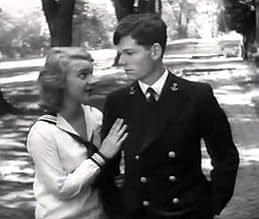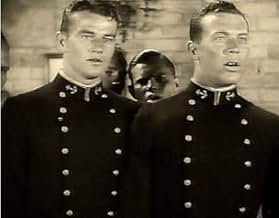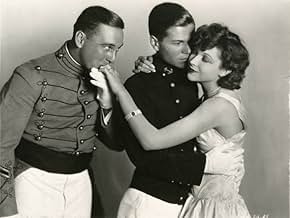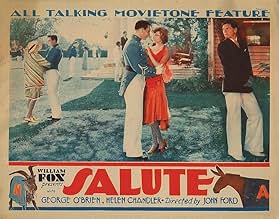Fraternal rivalry intensifies when two brothers play on opposing teams in a big Army-Navy football match.Fraternal rivalry intensifies when two brothers play on opposing teams in a big Army-Navy football match.Fraternal rivalry intensifies when two brothers play on opposing teams in a big Army-Navy football match.
John Breeden
- Midshipman
- (uncredited)
Ben Hall
- Midshipman Joel Farragut Gish
- (uncredited)
Jack Pennick
- Football Player
- (uncredited)
Harry Tenbrook
- Assistant Navy Coach
- (uncredited)
Lee Tracy
- Radio Announcer
- (uncredited)
John Wayne
- Midshipman Bill
- (uncredited)
Featured reviews
I had just watched John Ford's first Talking film, "The Black Watch" (1929) with Victor McLaglen and Myrna Loy, and I was amazed at how well it worked. It was an odd, but interesting mixture of a James Bond type movie with a "Gunga Din" British- in-India flavor. I was amazed that Ford made such a great talkie his first time out.
I was expecting good things here, as the movie starts out with seemingly as a drama with a brother joining the Navy to rival his older brother who has a successful career in the Army. It quickly goes from drama to light comedy, much of it very light.
The Naval Academy atmosphere is quite nice and realistic looking, but it clashes with the small scope of the comedy. The best gag in the film is a rather homely guy trying to fill up a dance card for his sister. The Academy men expect that his sister will look like him and make up excuses for not offering to dance. When she turns out to be very cute, they all change their minds and try to get a chance to dance with her.
Its predictable, but mildly amusing.
Without a developed central conflict, one is left to appreciate some of the films occasional nice touches. This is an early talking appearance by Stepin Fetchit. He's quite funny here. There's a funny brief guest appearance by future star Lee Tracy as a Football announcer. Also John Wayne and Ward Bond deliver a few laughs. It is amusing watching Wayne throw a pie at one of the Navy recruits.
It is the major central romantic characters in the film, William Janney and Helen Chandler, who are dull and have little chemistry together. Chandler did go on to star in "Dracula" (1931), so it is interesting watching her doing comedy here.
George O'brien get star billing, but he is really a minor supporting character. He was apparently given star billing because he was far more famous than Janney. He had starred in two hit films with Janet Gaynor, "Blue Eagle" (1926) and. F. W. Munau's masterpiece, "Sunrise," (1927). This was Janney's first starring role.
Again, if you want to see Ford directing a great action-adventure early talkie, watch "The Black Watch," if you want to see Ford sputtering at directing a quirky, predictable and dull light comedy, watch this one.
I was expecting good things here, as the movie starts out with seemingly as a drama with a brother joining the Navy to rival his older brother who has a successful career in the Army. It quickly goes from drama to light comedy, much of it very light.
The Naval Academy atmosphere is quite nice and realistic looking, but it clashes with the small scope of the comedy. The best gag in the film is a rather homely guy trying to fill up a dance card for his sister. The Academy men expect that his sister will look like him and make up excuses for not offering to dance. When she turns out to be very cute, they all change their minds and try to get a chance to dance with her.
Its predictable, but mildly amusing.
Without a developed central conflict, one is left to appreciate some of the films occasional nice touches. This is an early talking appearance by Stepin Fetchit. He's quite funny here. There's a funny brief guest appearance by future star Lee Tracy as a Football announcer. Also John Wayne and Ward Bond deliver a few laughs. It is amusing watching Wayne throw a pie at one of the Navy recruits.
It is the major central romantic characters in the film, William Janney and Helen Chandler, who are dull and have little chemistry together. Chandler did go on to star in "Dracula" (1931), so it is interesting watching her doing comedy here.
George O'brien get star billing, but he is really a minor supporting character. He was apparently given star billing because he was far more famous than Janney. He had starred in two hit films with Janet Gaynor, "Blue Eagle" (1926) and. F. W. Munau's masterpiece, "Sunrise," (1927). This was Janney's first starring role.
Again, if you want to see Ford directing a great action-adventure early talkie, watch "The Black Watch," if you want to see Ford sputtering at directing a quirky, predictable and dull light comedy, watch this one.
"Salute" is a John Ford co-directed film which features Ward Bond and John Wayne in prominent supporting roles. Sadly, it also features a LOT of Stepin Fetchit...a black character actor who is about as offensive as you can find back in 1929.
Midshipman Paul Randall (William Janney) is a new underclassman at the Naval Academy. Coincidentally, his brother, John, is a cadet at West Point...and they come from a very distinguished family. The story centers on Paul's experiences as a freshman and how he manages to hold up under near constant hazing from one particular upperclassman (Bond).
Despite Janny giving a nice performance and Wayne and Bond being in the film, it's also saddled with two problematic actors...Fetchit and Helen Chandler. I already mentioned Fetchit and his sub-human sort of characterization, but Chandler is a different story...she simply couldn't act. In "Dracula" she stared off into space a lot and had a real vacant look to her...and I thought perhaps she was directed to do this. But in "Salute", she's not much better and she lacked personality and was quite bland. As a result, it's a film I'd place in the time-passer category...not bad but not especially distinguished apart from being an early Wayne film.
Midshipman Paul Randall (William Janney) is a new underclassman at the Naval Academy. Coincidentally, his brother, John, is a cadet at West Point...and they come from a very distinguished family. The story centers on Paul's experiences as a freshman and how he manages to hold up under near constant hazing from one particular upperclassman (Bond).
Despite Janny giving a nice performance and Wayne and Bond being in the film, it's also saddled with two problematic actors...Fetchit and Helen Chandler. I already mentioned Fetchit and his sub-human sort of characterization, but Chandler is a different story...she simply couldn't act. In "Dracula" she stared off into space a lot and had a real vacant look to her...and I thought perhaps she was directed to do this. But in "Salute", she's not much better and she lacked personality and was quite bland. As a result, it's a film I'd place in the time-passer category...not bad but not especially distinguished apart from being an early Wayne film.
Okay, I'm watching all of John Ford's movies in order right now. I just finished watching Salute, and I will say one of two things happened during the making of it. Either John Ford was briefly sucked into another dimension or Ford is playing a big joke on all of us.
If I had seen this movie on TCM without seeing the credits I think I would have assumed that it was some rarely seen B-movie directed by someone I'd never heard of, but this was Fox's biggest grosser of 1929.
I really can't explain what is going on in the movie. It really is almost plot less with little vignettes of new recruits lives at the naval academy. It was really cool to see John Wayne and Ward Bond in the earliest speaking roles I have seen, but they really weren't actors then and their line readings are so stilted, but not just those two everybody talks bizarrely. Not to mention Stepin Fetchit who has to be the most bizarre character I've ever seen.
I mean there is the whole setup of these to brothers being in the military, but all that ever happens is that they play football.
Somehow this movie felt like it was a home movie that was released accidentally, I really can't see John Ford directing John Wayne to throw a pie at someone's face.
My conclusion is that John Ford and the crew must have gotten drunk, Ford passed out they kept the cameras rolling, all of the actors filmed their improvisations, then Ford woke up and edited together in something that might vaguely resemble a movie.
I can't rate this because I'm not sure if its a work of genius or the accidental work of a sleeping man., or maybe I was right in the beginning...its all one big practical joke on the audience.
If I had seen this movie on TCM without seeing the credits I think I would have assumed that it was some rarely seen B-movie directed by someone I'd never heard of, but this was Fox's biggest grosser of 1929.
I really can't explain what is going on in the movie. It really is almost plot less with little vignettes of new recruits lives at the naval academy. It was really cool to see John Wayne and Ward Bond in the earliest speaking roles I have seen, but they really weren't actors then and their line readings are so stilted, but not just those two everybody talks bizarrely. Not to mention Stepin Fetchit who has to be the most bizarre character I've ever seen.
I mean there is the whole setup of these to brothers being in the military, but all that ever happens is that they play football.
Somehow this movie felt like it was a home movie that was released accidentally, I really can't see John Ford directing John Wayne to throw a pie at someone's face.
My conclusion is that John Ford and the crew must have gotten drunk, Ford passed out they kept the cameras rolling, all of the actors filmed their improvisations, then Ford woke up and edited together in something that might vaguely resemble a movie.
I can't rate this because I'm not sure if its a work of genius or the accidental work of a sleeping man., or maybe I was right in the beginning...its all one big practical joke on the audience.
Bad performances by George O Brian and William Janney as rival brothers who end up playing the big Army-Navy football game against each other. Steppin Fetchit is given a lot of screen time and his performance is embarrassing and racist by today's standards, but he might make you smile occasionally even while you wince;he is very charismatic.John Wayne has a few brief scenes as one of a trio of cadets who haze (very mildly) the hero.The best parts of the movie are the unusually crisp location filming of the real Annapolis circa 1929. The big football game is unexciting and has no surprises. There is one good performance by Frank Albertson whose spirited portrayal of the callow roommate who talks back to his C.O. is the film's highlight.No real John Ford touches in this programmer.
Salute is an early talkie directed by John Ford and it will never rank in anybody's list of great John Ford films. He honed this particular genre of military academy films down to a science in much better films like The Long Grey Line and Wings Of Eagles.
George O'Brien and William Janney are brothers raised by different grandfathers, O'Brien by a general and Janney by an Admiral and they both go to the service academies of each. O'Brien being older got to West Point before Janney arrived at Annapolis.
Janney is always playing second fiddle to O'Brien and when O'Brien puts some moves on Helen Chandler who Janney has flipped over, that makes the Army/Navy game a bit more personal than usual.
John Wayne and Ward Bond are a pair of upper classmen in Annapolis who take Janney over the coals. Best performance in the film is from Frank Albertson as Janney's smart mouth roommate.
It was interesting to see both Wayne and Bond before either of them was any kind of a name. The integration of newsreel footage of the Army/Navy game was well done by Ford, very similar to how he used newsreel film from Ireland in The Plough And The Stars. But Salute is a film for John Wayne or John Ford completists.
George O'Brien and William Janney are brothers raised by different grandfathers, O'Brien by a general and Janney by an Admiral and they both go to the service academies of each. O'Brien being older got to West Point before Janney arrived at Annapolis.
Janney is always playing second fiddle to O'Brien and when O'Brien puts some moves on Helen Chandler who Janney has flipped over, that makes the Army/Navy game a bit more personal than usual.
John Wayne and Ward Bond are a pair of upper classmen in Annapolis who take Janney over the coals. Best performance in the film is from Frank Albertson as Janney's smart mouth roommate.
It was interesting to see both Wayne and Bond before either of them was any kind of a name. The integration of newsreel footage of the Army/Navy game was well done by Ford, very similar to how he used newsreel film from Ireland in The Plough And The Stars. But Salute is a film for John Wayne or John Ford completists.
Did you know
- TriviaJohn Wayne was responsible for assembling a group of USC football players for the cast, one of which was Ward Bond. The director was furious at Bond for constantly ordering steak and drinks from hotel room service and fired him. Wayne stood up to the director and forced him to keep Bond on, and a lifetime friendship was born.
- GoofsJohn Wayne is introduced in the film as one of the new midshipman, visible in their early training, especially in the rowing sequence. But later, he has a noticeable role as an upperclassman hazing the new men.
- ConnectionsFeatured in Men Without Women (1930)
- SoundtracksAnchors Aweigh
(1906) (uncredited)
Music by Charles A. Zimmerman
Played at the dance and as background
Sung by the John Wayne, Frank Albertson, and midshipmen
Played on piano by Helen Chandler
Sung by Helen Chandler and William Janney
Details
- Runtime
- 1h 24m(84 min)
- Color
- Aspect ratio
- 1.20 : 1
Contribute to this page
Suggest an edit or add missing content







































